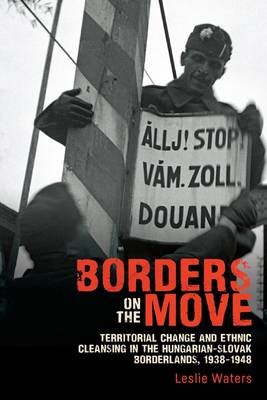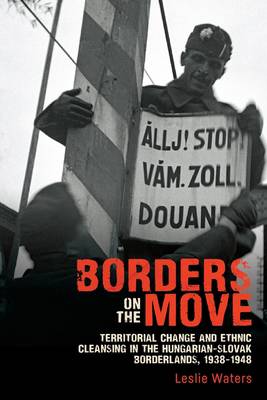
Bedankt voor het vertrouwen het afgelopen jaar! Om jou te bedanken bieden we GRATIS verzending (in België) aan op alles gedurende de hele maand januari.
- Afhalen na 1 uur in een winkel met voorraad
- In januari gratis thuislevering in België
- Ruim aanbod met 7 miljoen producten
Bedankt voor het vertrouwen het afgelopen jaar! Om jou te bedanken bieden we GRATIS verzending (in België) aan op alles gedurende de hele maand januari.
- Afhalen na 1 uur in een winkel met voorraad
- In januari gratis thuislevering in België
- Ruim aanbod met 7 miljoen producten
Zoeken
Borders on the Move
Territorial Change and Ethnic Cleansing in the Hungarian-Slovak Borderlands, 1938-1948
Leslie Waters
€ 177,45
+ 354 punten
Omschrijving
The movement of borders and people was a remarkably common experience for mid-twentieth-century Central and Eastern Europeans. Such was the case along the border between Czechoslovakia and Hungary, where territory changed hands in 1938 and again in 1945. During the intervening period and beyond, residents of the borderland were caught in a nearly continuous onslaught of ethnic cleansing - expulsion of Czech and Slovak "colonists," Jewish deportations during the Holocaust, and postwar population exchanges - that was meant to reshape the territory first in the desired image of the Hungarian state and later on in that of Czechoslovakia.
Borders on the Move examines the impact of border changes and migrations on this region between 1938 and 1948. It investigates the everyday consequences of geopolitical events that are well-known from the perspective of international and national histories, but does so explicitly in the context of the borderland. Making skillful use of state and local archival sources in Hungary and Slovakia, author Leslie Waters illuminates the catastrophic effects of state action - including sweeping wealth redistribution and the expulsion of those perceived as enemies of the state - on individuals. This engagingly written and far-reaching work will be invaluable to scholars of the Holocaust and of East Central Europe as well as to those who study forced migration, population exchange, and inter-ethnic relations.
LESLIE WATERS is assistant professor of history at the University of Texas at El Paso.
Borders on the Move examines the impact of border changes and migrations on this region between 1938 and 1948. It investigates the everyday consequences of geopolitical events that are well-known from the perspective of international and national histories, but does so explicitly in the context of the borderland. Making skillful use of state and local archival sources in Hungary and Slovakia, author Leslie Waters illuminates the catastrophic effects of state action - including sweeping wealth redistribution and the expulsion of those perceived as enemies of the state - on individuals. This engagingly written and far-reaching work will be invaluable to scholars of the Holocaust and of East Central Europe as well as to those who study forced migration, population exchange, and inter-ethnic relations.
LESLIE WATERS is assistant professor of history at the University of Texas at El Paso.
Specificaties
Betrokkenen
- Auteur(s):
- Uitgeverij:
Inhoud
- Aantal bladzijden:
- 246
- Taal:
- Engels
- Reeks:
- Reeksnummer:
- nr. 25
Eigenschappen
- Productcode (EAN):
- 9781648250019
- Verschijningsdatum:
- 1/12/2020
- Uitvoering:
- Hardcover
- Formaat:
- Genaaid
- Afmetingen:
- 152 mm x 229 mm
- Gewicht:
- 498 g

Alleen bij Standaard Boekhandel
+ 354 punten op je klantenkaart van Standaard Boekhandel
Beoordelingen
We publiceren alleen reviews die voldoen aan de voorwaarden voor reviews. Bekijk onze voorwaarden voor reviews.









